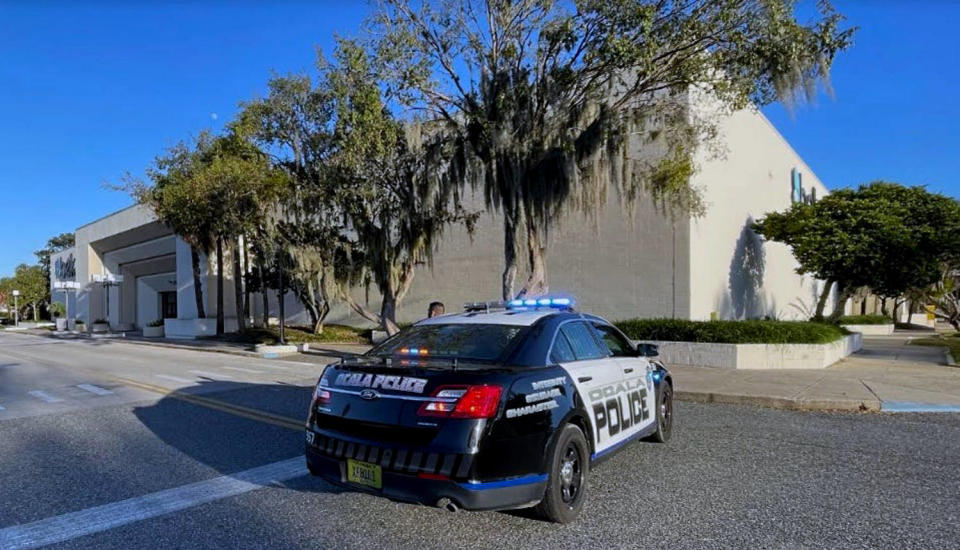Deleted phone calls, white lies and new allegations of a third accomplice in Crystal Rogers’ disappearance were the points of discussion at a court hearing Thursday, where prosecutors and defense attorneys argued over an immunity deal gone sour.
Steve Lawson, who told police he moved Rogers’ car at the behest of her then-boyfriend around the time of her disappearance, argued in Nelson Circuit Court that his charges should be dropped because prosecutors failed to keep a promise of immunity.
Prosecutors, meanwhile, said that deal fell through after Steve Lawson continually changed key parts of his testimony and minimized his role in Rogers’ disappearance.
Rogers, a 35-year-old mother of five children, went missing around July 3, 2015, from Bardstown, Kentucky. Her car was soon found abandoned on the Bluegrass Parkway with her keys, phone and purse inside. While her body has never been found, she is presumed dead by investigators.
Rogers’ case finally received a break in recent months, when her boyfriend Brooks Houck and a father and son pair, Steve and Joseph Lawson, were separately arrested.
Steve Lawson, 53, is charged with conspiracy to commit murder as well as tampering with physical evidence.
At Thursday’s hearing, prosecutor Shane Young said Steve Lawson was the first person to come forward and tell investigators he was involved in Rogers’ disappearance.
“There was no bigger fan of the defendant than me,” Young said.
In those early talks with police, Young said there was an immunity deal on the table for Steve Lawson, as long as he told the total truth and had not directly hurt Rogers or participated in her murder.
According to Young, investigators brought up the necessity of Steve Lawson telling the complete truth 27 times, just in a single interview.
While his cooperation was initially promising and led to the indictments of Houck and Joseph Lawson, Steve Lawson’s son, Young said investigators began to see Steve Lawson “was telling a story where he was trying to minimize his role, which led to him providing untruthful statements.”
Steve Lawson’s defense attorney Theodore Lavit said his client did not lie in any of his statements and argued investigators led Lawson in the interviews in order to hear what they wanted.
During the hearing, the prosecution played a series of interview excerpts between Steve Lawson and investigators, where the defendant’s testimony featured inconsistencies with his previous statements or other evidence.
In a major revelation, Young said investigators believe Steve Lawson’s then-wife was involved in Rogers’ disappearance, based on cell phone records placing her on Bluegrass Parkway at the same time as her husband. Investigators believe the Lawsons were moving Rogers’ car at this time.
During police interviews, Steve Lawson was seen telling officers his wife, who is now deceased, was not with him or anywhere near the area at that time.
In another instance, Steve Lawson gave conflicting statements to police as to whether or not he knew of a plan to move Rogers’ car to Bluegrass Parkway ahead of time. Another point of contention was the role and location of a skid-steer loader, or a bobcat, that prosecutors believe was used in some capacity of the crime.
If Steve Lawson’s defense could prove he never lied to investigators, Young said, “I’ll hold up my part of the agreement.”
Lavit said all of Steve Lawson’s statements were either truthful or that Lawson did not deliberately tell a lie. Any minor inconsistencies shouldn’t void the immunity deal, which was never committed to writing, because his testimony led to the indictments of Houck and Joseph Lawson, according to Lavit.
“(The immunity agreement) was all governed by the Commonwealth. It was all led by the Commonwealth. It was all promoted by the Commonwealth,” Lavit said. “They had complete control over what that agreement was.”
Lavit also presented the judge a flash drive he said contained police interviews with Steve Lawson, where the actual wording used in each reference to the immunity’s terms changed and did not always assert the necessity of complete honesty. Lavit did not play any excerpts of those interviews and did not reference specific examples of the wording’s alleged changes when the judge asked.
In advance of Thursday’s hearing, Houck’s defense submitted a 40-page motion rebuffing prosecutor Young’s request to consolidate the three defendants’ cases into a joint trial, which shared previously unreleased details about Steve Lawson’s testimony to investigators.
Houck’s motion provided excerpts of transcribed interviews that allegedly took place between Steve Lawson and police, in which Steve Lawson said he called Houck at midnight around the time of Rogers’ disappearance to tell him “the job” of moving her car was completed.
On Thursday, Lavit said that phone call was actually about a residential property and had nothing to do with Rogers, which Young interrupted and said contradicts Lawson’s testimony to the grand jury.
Separately, if Steve Lawson’s charges are not dismissed, Lavit made a motion to strike all of his interviews with police as well as grand jury testimony during the time that talks of immunity were still active. Young said he agreed to have those police interviews stricken but argued Steve Lawson’s grand jury testimony should be admissible as evidence in the trial.
Simms has yet to make a ruling on either motion.
Reach reporter Rachel Smith at rksmith@courierjournal.com or @RachelSmithNews on X, formerly known as Twitter.
This article originally appeared on Louisville Courier Journal: Prosecutors allege third accomplice in Crystal Rogers disappearance
Signup bonus from



